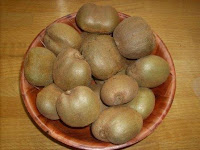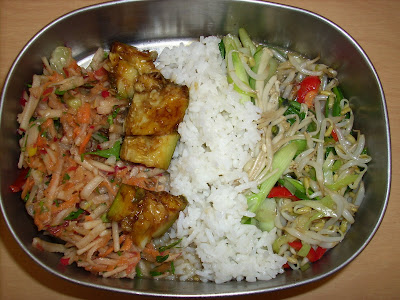 Friend Ruby gave me a bag of “irregular” (not sold in markets) kiwifruits (aka Chinese gooseberry, or National Fruit of People’s Republic of China) for dehydrating, which intensifies flavor
Friend Ruby gave me a bag of “irregular” (not sold in markets) kiwifruits (aka Chinese gooseberry, or National Fruit of People’s Republic of China) for dehydrating, which intensifies flavor Because of our Indian summer (late September to early November), the air just didn’t feel like autumn/fall until after Daylight Savings Time ended. Now with leaves falling and a slight chill in the air, I really should discuss autumn/fall seasonal eating before winter arrives on December 22. The Free Farm was closed yesterday so I could do some catching up and share cooking photos :-)!
Because of our Indian summer (late September to early November), the air just didn’t feel like autumn/fall until after Daylight Savings Time ended. Now with leaves falling and a slight chill in the air, I really should discuss autumn/fall seasonal eating before winter arrives on December 22. The Free Farm was closed yesterday so I could do some catching up and share cooking photos :-)!According to Chinese Medicine’s Five Element system, the autumn/fall season is associated with metal (element), white (color), grief (emotion), spicy/pungent (taste), lungs/large intestine (body organs), and dryness (climate).
Autumn is about balance (slowing down as we transition from busy summer and getting more rest as our days get shorter) and elimination (knowing what to let in, what to let go; give and take). Spicy/pungent foods act to disperse and move qi (energy): easing digestion, strengthening the lungs (clearing cough/phlegm), distributing energy (releasing cold) and stimulating circulation to treat qi or blood stagnation. But moderation is in order because too much spicy foods can dry out lungs and result in imbalance.
As autumn prepares us for the season of rest, our nights become longer than days and we begin our cycle of introspection. Lungs and large intestine are associated with the emotions of grief and melancholy, which are not usually expressed in wood (anger)/fire (joy-excitement) dominant American culture. However, holistic Chinese medicine (unlike the Cartesian mind-body split) views the suppression of emotions as damaging so one may manifest ill physical symptoms when out of balance with nature.
Lung dis-ease includes allergies, asthma, bronchitis, chronic cough, colds, runny nose, sinus congestion, suppressed immune system, etc. Since the grief emotion, like Seasonal Affective Disorder (SAD), surfaces during autumn, it should be acknowledged and expressed in constructive ways, such as cathartic bawling out (watch tear-jerker “Though nothing can turn back the hour of splendor in the grass,. . . we will grieve not, rather find strength in what remains behind” farm scene at http://www.youtube.com/watch?v=HOW8ZDgTJdo), confiding in family and friends, journaling (got blog?), meditating, praying, singing out loud:
Apples peaches pumpkin pie
Who's afraid to holler I?
That's a game we used to play.
Hide and seek was its name.
Oh ready or not, here I come,
Gee that used to be such fun.
I always used to find a hiding place,
Times have changed.
Well I'm one step behind you, but still I can't find you.
Apple peaches pumpkin pie,
You were young and so was I.
Now that we've grown up it seems
You just keep ignoring me. . .
“Apples, Peaches, Pumpkin Pie” lyrics by M. Irby
http://www.youtube.com/watch?v=zaENxilZe60&feature
People who don’t express, or hold on to, grief tend to suffer from lung imbalances that weaken their energy (shallow breathing, pale skin). Rather than be burdened by grief, those who have strong lungs (deep breathing by inhaling through nose, exhaling through mouth) can release the past and maintain a balanced emotional perspective. Clear thinking is associated with healthy elimination (breathing, bowel movements).
Our lungs are the only organ in direct contact with the outside so we need to take special care. Cold can injure lungs; to stay warm and hydrated in chilly climate: eat warm soups and cooked foods (including steamed fruits).
 Breakfast: ginkgo nut + 5-bean/yam/taro jook (rice porridge), steamed rice noodle (soy/hoisin/sesame/chili sauces), kale/carrot salad (Prepared by Mary Fok)
Breakfast: ginkgo nut + 5-bean/yam/taro jook (rice porridge), steamed rice noodle (soy/hoisin/sesame/chili sauces), kale/carrot salad (Prepared by Mary Fok)Clear up lung problems by eliminating/reducing phlegm-inducing foods like dairy, eggs, high-fat meats. Bland rice has the greatest healing effect on the large intestine because its fiber speeds up intestinal transit time, while cleansing/eliminating the colon of accumulated fat and stored up waste.
 Rice dishes: apple/carrot/parsley salad, steamed zucchini, bok choy/enoki mushroom (moist stir-fry), bean sprouts/red pepper/garlic chive (dry stir-fry) (Prepared by Mary Fok)
Rice dishes: apple/carrot/parsley salad, steamed zucchini, bok choy/enoki mushroom (moist stir-fry), bean sprouts/red pepper/garlic chive (dry stir-fry) (Prepared by Mary Fok)Metal seasonal whole foods: grains (rice); vegetables (broccoli, brussels sprouts, cabbage, cauliflower, celery, mustard greens, turnip greens, onion, watercress); roots (carrot, daikon, lotus root, ginger, sweet potato, taro, turnip); beans (navy, soybeans, great northern, tofu, tempeh); fruit (apple, butternut squash, chestnuts, grapes, pears, peaches, loquat, pumpkin, tangerine); herbs (basil, bay leaf, black pepper, cardamom, cinnamon, coriander, dill, fennel, garlic, horseradish, Job’s tears, licorice, nutmeg, thyme); and mushrooms!
 Herbal soup: goujizi (wolfberry), dangshen (codonopsis), qianzhi (foxnut), lianzi (lotus seed), yiyi ren (Job’s tear barley), dazao (Chinese date); vegetable stock made with ginger, chestnuts, dates, mushrooms (Prepared by Mary Fok)
Herbal soup: goujizi (wolfberry), dangshen (codonopsis), qianzhi (foxnut), lianzi (lotus seed), yiyi ren (Job’s tear barley), dazao (Chinese date); vegetable stock made with ginger, chestnuts, dates, mushrooms (Prepared by Mary Fok)Chinese herbs to strengthen lungs: apricot seeds (spicy-sweet tian xingren moistens dry cough; spicy bitter ku xingren stops cough by circulating qi), astragalus, sword flower, white wood ear
 Soothing steamed pear stuffed with honey + ground up sweet apricot seeds/sinkiang fritillary bulb/lily bulb/dried lotus root (Prepared by Nam Singh)
Soothing steamed pear stuffed with honey + ground up sweet apricot seeds/sinkiang fritillary bulb/lily bulb/dried lotus root (Prepared by Nam Singh)Lifestyle tips to keep lungs strong, reduce stress/grief, increase stamina and support rest/relaxation:
• Prioritize and set boundaries (just say, no thanks!) so you have time for self-care (including slow, deep breathing for energy, peace and focus) -- then later you’ll have more energy to care for others
• Let the sunshine in to stimulate production of vitamin D, replenish adrenal glands, increase serotonin levels
• Exercise gently to move qi through system – as in tai chi or gardening at The Free Farm!
• Be mindful: when in grief (as in loss), think gratitude (as in value what we have) and acceptance (as in Kubler-Ross’ grief cycle resolution)
And when the going gets rough, the tough eat well and get rest!
Taoism (“way of nature”), the basis of Chinese medicine, is about balanced living within nature—through meditation, breathing, exercise and diet. When the mythical Yellow Emperor asked how one can achieve a long and healthy life, his trusted health advisor Chi Po responded: “Observe your environment, don’t get chilled or hot, balance the emotions, remain calm, and know yourself.”
Seasons are cyclical and thus continue . . .
Winter (water, black, fear, salty, kidney/urinary bladder, cold): http://thefreefarm.blogspot.com/2011/01/healthy-eating-for-winter.html
Spring (wood, green, anger, sour, liver/gall bladder, wind): http://thefreefarm.blogspot.com/2011/05/spring-cleaning-time.html
Summer (fire, red, joy, bitter, heart/small intestine, heat): http://thefreefarm.blogspot.com/2011/07/summer-breeze.html
In addition to the four seasons, Chinese Medicine recognizes Late Summer as a transitional season. Late summer, which is equivalent to our Indian summer, is associated with earth (element), yellow (color), worry (emotion), sweet (taste), spleen/stomach (body organs) and humidity (climate). Learn more from Briahn Kelly-Brennan’s Everyday Healing Foods (which includes Mary Fok’s cooking demos and recipes) at http://www.ccsf.edu/Resources/Faculty/bkelly/.
Public Service Announcement:
November is Lung Cancer & COPD Month: Spare the Air!
Lung cancer is the leading cancer killer in both men and women in the United States. In fact, more people die from lung cancer than colon, breast and prostate cancer combined. Chronic obstructive pulmonary disease (COPD) – which includes emphysema and chronic bronchitis – is the 3rd leading cause of death in the U.S. Learn more at http://www.lungusa.org/about-us/our-impact/top-stories/lung-cancer-and-copd-2.html

No comments:
Post a Comment